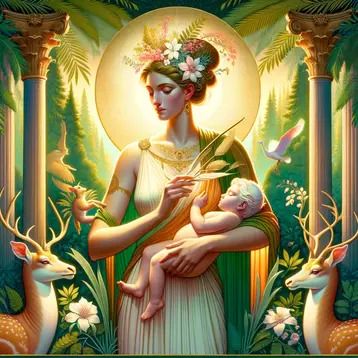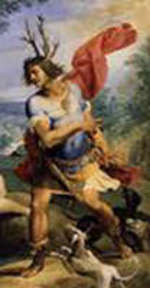
Artemis
🏹 Artemis :: Greek Goddess of the Hunt and the Moon
Artemis is the Olympian goddess of the hunt, the moon, and chastity; in time, she also became associated with childbirth and nature. No more than few days old, she helped her mother Leto give birth to her twin brother Apollo. Artemis was very protective of her and her priestesses’ innocence. Consequently, she wasn’t very nice when some of them weren’t so careful.
Artemis’ Role
Artemis' Name
Even though Plato says that the name “Artemis” is related to her virginity and the Ancient Greek word for “unharmed” or “pure,” we now know that its origin is undoubtedly different and possibly even Persian. However, scholars can’t agree over its original meaning.
Artemis' Portrayal and Symbolism
Sculptors, poets, and painters, however, had no such problems. Artemis is almost universally depicted as a young, beautiful and vigorous huntress carrying a quiver with arrows and holding a bow, typically wearing a short knee-high tunic and often accompanied by some animal (stag, doe, or hunting dogs). As a moon goddess, she is sometimes represented wearing a long robe and a crescent moon crown.
Artemis' Epithets
Homer calls Artemis either “The Mistress of Animals” or “She of the Wild.” As a huntress, she is also often referred to as “arrow-pouring” or “deer-shooting.” Just like her brother, she may be occasionally called “bright” or, even more, illustrative of her function as a moon goddess, “torch-bringer.”
Artemis’ Family and Birth
The Trials of Leto
Artemis is the daughter of Zeus and Leto, herself a daughter of the Titans Coeus and Phoebe. Angered by her husband’s infidelity, Hera hunted Leto over the whole planet and forbade her to give birth anywhere on solid earth.
The Birth of Artemis
However, Leto got to the island of Delos and gave birth to Artemis while balancing herself on an olive branch.
When Hera heard this, she prohibited her daughter Eileithyia, the goddess of childbirth, of further helping Leto. This postponed the birth of Apollo for nine days. And who knows how much more time it would have passed if the baby Artemis hadn’t miraculously learned the art of midwifery and helped Leto finally deliver her brother.
Artemis Protecting Leto · Niobe and Tityus
Artemis and Apollo were very protective of their mother. When Niobe – a mother of six boys and as many girls – boasted that while Leto gave birth to two gods, she delivered a whole Olympus, Apollo and Artemis killed all her children. Apollo took care of the male offspring and Artemis of Niobe’s daughters. On another occasion, Tityus tried to rape Leto. Naturally, he was killed by Apollo’s and Artemis’s arrows.
Artemis, the Vengeful Virgin Goddess
When Artemis was still a little maid, she asked from her father Zeus to keep her maidenhood forever. So – just like Athena and Hestia – she remained chaste for eternity. And she guarded this vow even more vigorously than them.
Artemis and Actaeon
For example, when the hunter Actaeon saw her bathing naked, she transformed him into a stag and set his hounds against him. Needless to add, Actaeon was ripped apart to pieces.
Artemis and Siproites
The less famous Siproites was just a boy when he had Actaeon’s misfortune of accidentally seeing the goddess unclothed. So, he was punished less severely: Artemis transformed him into a girl.
Artemis and Orion
Others tried to rape Artemis; none of them lived to tell. The most famous story involves Orion, a long-time hunting companion of hers. In fact, he may as well have been Artemis’ only love interest. However, when he tried taking off Artemis’ robe, the goddess killed him. Others say that Orion was actually killed by a scorpion sent by Gaea or an Apollo’s arrow; the gods merely tried to keep Artemis’ virginity intact the only time she couldn’t.
Artemis, the Defender of Purity
Artemis didn’t only take care of her own purity; she also defended the innocence of her worshippers. And was merciless if any one of her priestesses ever lost it.
Artemis and Callisto
For example, after her hunting attendant Callisto gave birth to Zeus’s son Arcas, Artemis contrived with Hera to turn her into a bear. The plan was to have Arcas kill her/ However, just as that was about to happen, Zeus placed both of them into the heavens as the constellations Ursa Major and Ursa Minor.
Artemis and Hippolytus
Just as she punished the transgressors of the sacred vow, Artemis rewarded those who kept it. So as to devote himself to a chaste life, Hippolytus scorned Aphrodite after which the goddess of love made his stepmother fall in love with him. This set a chain of events which led to Hippolytus’ death. However, Artemis called upon Asclepius and resurrected Hippolytus as a new man, who subsequently ruled in Italy under the name of Virbius.
Artemis and Iphigenia
In the case of Iphigenia, Artemis substituted the girl with a deer just as Iphigenia was about to be sacrificed by her father, Agamemnon. Afterward, she took Iphigenia with her in Tauris and made her a priestess of her cult.
Obscure Facts about Artemis
One common misconception about Artemis is that she was the goddess of fertility. While she did eventually become associated with childbirth, her primary roles were that of the hunt, the moon, and chastity. She was not typically invoked for matters of fertility, as there were other goddesses, such as Demeter and Aphrodite, who were more commonly associated with this aspect of life.
Artemis and Amazons
An intriguing, yet often overlooked, fact about Artemis is her association with the Amazons, a legendary tribe of warrior women. Some ancient sources suggest that Artemis was the patron goddess of these fierce fighters, providing them with strength and guidance in battle. This connection further emphasizes Artemis' empowering role as a protector of women and her embodiment of female independence.
Artemis and Ephesus
Another little-known fact about Artemis is her connection to the ancient city of Ephesus, located in modern-day Turkey. The Temple of Artemis in Ephesus, one of the Seven Wonders of the Ancient World, was a magnificent structure dedicated to her worship. This temple not only served as a place of worship, but also as a sanctuary for those seeking refuge, showcasing another aspect of Artemis' protective nature.
Artemis: Protector, Huntress, Moon Goddess
In our experience, exploring the stories and myths of Artemis has been an enlightening and enriching journey. We've gained a deeper understanding of the complexities and nuances of the goddess, as well as the roles she played in the lives of the ancient Greeks. One of our favorite aspects of Artemis is her unwavering commitment to her own principles and the lengths she would go to defend her honor and the purity of her followers. From transforming Actaeon into a stag to turning Callisto into a bear, Artemis' stories are a testament to her fierce determination to uphold her values.
As we delved deeper into the myths of Artemis, we also became fascinated with her connection to the moon and her ability to wield both light and darkness. This duality adds another layer to her already complex persona and makes her even more intriguing as a deity. Ultimately, our exploration of Artemis has left us in awe of her power, her devotion to her followers, and her unique place in the pantheon of the ancient Greek gods.
Artemis Sources
“The Homeric Hymn to Artemis” may be short and merely descriptive, but Callimachus’ 3rd Hymn dedicated to Artemis is lengthy and rather charming. Euripides’ celebrated plays “Hippolytus” and “Iphigenia in Tauris” tell two of the most famous stories related to Artemis.
See Also: Actaeon, Apollo, Leto, Orion
Artemis Video
Artemis Q&A
Link/Cite Artemis Page
Written by: The Editors of GreekMythology.com. GreekMythology.com editors write, review and revise subject areas in which they have extensive knowledge based on their working experience or advanced studies.
For MLA style citation use: GreekMythology.com, The Editors of Website. "Artemis". GreekMythology.com Website, 19 Apr. 2023, https://www.greekmythology.com/Olympians/Artemis/artemis.html. Accessed 25 April 2024.




